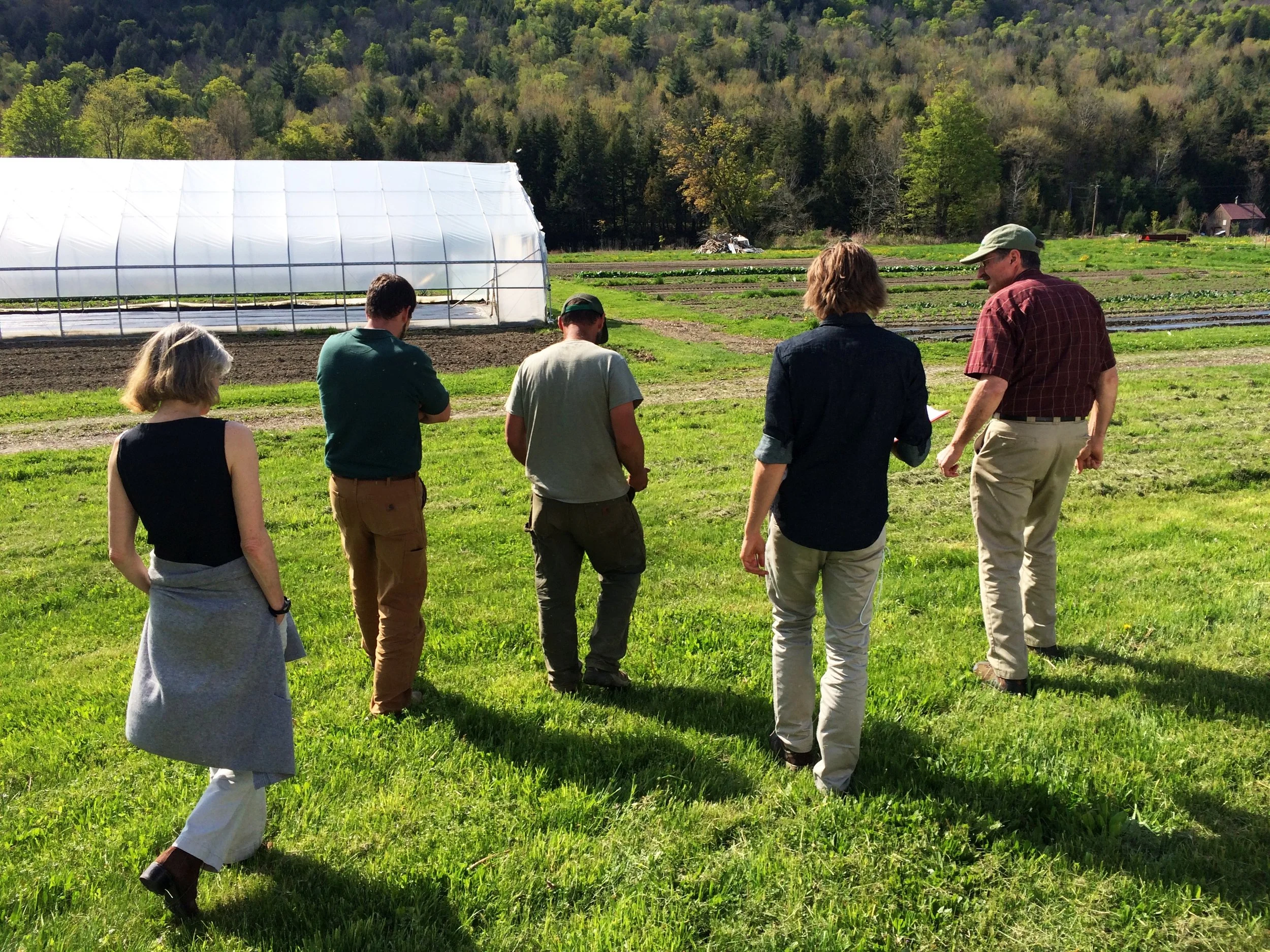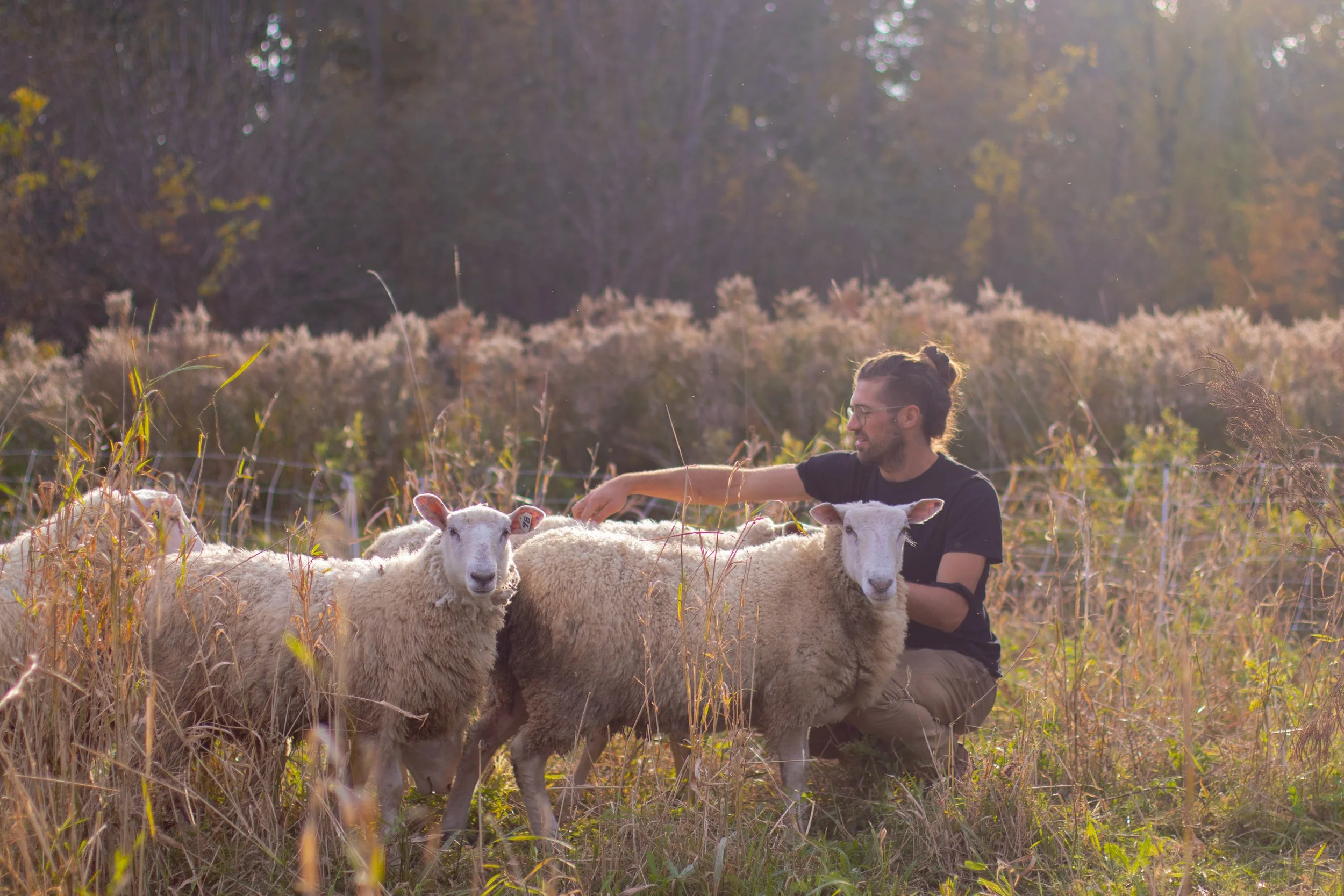Rachel E. Schattman, PhD
Associate Professor of Sustainable Agriculture
Fellow, George J. Mitchell Center for Sustainability Solutions
Associate, University of Maine Climate Change Institute
Dr. Schattman earned her B.A. from Sarah Lawrence College, and her M.S. and Ph.D. from the University of Vermont. During her doctoral research, she took an interdisciplinary approach to studying the effects of a changing climate on specialty crop production in the Northeast United States. Prior to coming to the University of Maine, she served as a post-doctoral researcher with the USDA Northeast Climate Hub where she studied agricultural perspectives on climate change and adaptation, and designed curricula targeted to adult learners.
Lab employees
Ian Farm
Lab manager
Ian’s work in agriculture began through working as a farm hand during his high school years in southern Maine. He went on to earn a B.A. in Ecology with a minor in Environmental Studies from Dartmouth College in New Hampshire. There, he researched agroforestry and plant-soil feedback, while continuing to work on farms and orchards in the area. As the laboratory manager, Ian’s work includes data management, research methods and equipment, site maintenance, and safety.
Post doctoral research associates
Dr. Janica Anderzén
Postdoctoral Research Associate
Janica joined the Agroecology Lab in May 2023 after earning a Ph.D. in Agroecology at the University of Vermont (UVM). For her Ph.D., Janica conducted research on socio-economic characteristics and impacts of agricultural diversification in smallholder coffee farmer communities in Chiapas, Mexico, focusing specifically on the multifunctional role of beekeeping in coffee systems. Her dissertation work formed part of a transdisciplinary, Participatory Action Research process with a coffee farmer cooperative and other partners. The experience strengthened her belief in the power of horizontal knowledge co-creation as a critical element of agroecological transformations. Prior to her studies at UVM, Janica worked in several human rights and environmental non-profits. In her new role as a Postdoctoral Research Associate, she’s excited to learn more about agroecological processes in the Northeast and deepen her skills as a transdisciplinary scholar. With deep roots in Finland, Janica feels the happiest in a forest or by a lake - camping, hiking, or paddling.
Dr. Olusegun Idowu
Postdoctoral Research Associate
Before joining the UMaine Agroecology Lab, Olusegun was a Postdoctoral Research Fellow at Kyoto University, Japan (from 2022 – 2023). He earned a MSc, and Ph.D. in Crop Science from Kyoto University, Japan (2016 - 2022). During his Ph.D., program Olusegun researched rice yield and quality under varied nitrogen fertilizer applications in different ecological environments. His study was encompassed fields experiments, pot experiments using growth chambers, using crop science and plant molecular concepts. Olusegun has worked as a consultant with Meiwa Co. Ltd., Japan and contributed to the promotion of the acceptance and utilization of biochar under the climate-smart Agriculture strategy of the United Nations (UN). Before moving to Japan, he worked with the National Center for Agricultural Mechanization (NCAM) in Ilorin, Nigeria as a soil scientist/agronomist. There, he contributed for the promotion of sustainable agriculture among farmers through indigenous agricultural technologies. In his work with the UMaine Agroecology Lab, Olusegun will contribute on research related to PFAS in agroecosystems, how to improve soil fertility and crop yield/quality, as well as to approaches to promote a healthy environment.
PHD Students
Gladys Adu Asieduwaa
Ph.D. student in Ecology and Environmental Science
Gladys graduated from the ISARA Lyon University, France and the Norwegian University of Life Sciences, Norway, where she earned a double degree European Master of Science in Agroecology. During the course of her MSc, she was privileged to have undertaken an Erasmus exchange at the University of Kassel, Germany where she studied MSc Sustainable Food Systems. She worked with the French National Research Institute for Agriculture, Food and the Environment, where she simulated the impacts of climate change and scenarios of adapted cropping practices on the risk of brown rust development in winter wheat in some French regions. She also worked with the European Union Knowledge Centre consortium on Global Food and Nutrition Security, to structure existing knowledge about agroecology as a farming and food system in developing countries. She is passionate about Agroecology and Climate-Smart Agriculture measures that transform farm and food systems towards sustainability to promote food and nutrition security.
Ali Bello
Ph.D. student in Ecology and Environmental Science
Ali Bello hails from a rural district in Kano state, Nigeria, where agriculture is not just a profession but a way of life. Upon completing his high school, Ali's father, recognizing the challenges posed by climate change to the agricultural sector in African countries, advised him to pursue a bachelor's degree in agriculture, with the belief that Ali could be part of the solutions. This motivated Ali to study agriculture for his bachelor’s, where he specialized in crop science.
Ali joined the agroecology lab in 2022, where he completed a master’s degree (in 2024) and researched the effects of precipitation change on wild blueberries. He eagerly looks forward to extending his journey at the agroecology lab by pursuing a Ph.D.
Alexandra Scearce
Ph.D. student in Ecology and Environmental Science
Alex earned a B.S. in Ecology and Evolutionary Biology with a minor in Sustainability from the University of Tennessee at Knoxville. At UTK, she studied the interactive effect of fire disturbance and soil microbial composition on oak regeneration to inform management strategies. She was then employed with the USDA-ARS to conduct crop and integrated pest management research. Alex completed her masters with the Agroecology Lab in 2024, which focused on uptake of PFAS into plants to inform crop selection for contaminated agroecosystems. She is currently researching the strength of multi-trophic interactions and the role they play in responding to climate stress within wild blueberry, Vaccinium angustifolium, systems as a PhD student.
MASTERS STUDENTS
Kahryn Cullenberg
M.S. student in Ecology and Environmental Sciences
Kahryn grew up in Farmington, Maine, where she spent several summers working as a CSA farm hand. She earned her B.A. at Bates College in Lewiston, Maine, double majoring in Environmental Studies and Gender & Sexuality Studies. At Bates, Kahryn conducted community-engaged research on intergenerational conservation strategies for farm and forest landowners within Auburn, Maine's Agriculture and Resource Protection Zone. This research focused primarily on the tradeoffs of local carbon credit programs. At the University of Maine, Kahryn's graduate research involves the conservation of brown ash (Fraxinus nigra) given the impacts of the emerald ash borer (Agrilus planipennis), and non-industrial forest landowners' willingness to manage existing brown ash and establish seedlings on their property.
Research associates
Sam Bliss
Research Associate
Sam raises, shares, and studies food that's not for sale. He holds a Ph.D. in natural resources from the University of Vermont, where he now teaches applied economics and does research on how gardening, hunting, fishing, and foraging contribute to food security in Northern New England. Sam is a shepherd, musician, writer, and community organizer. He has spoken publicly about his work in non-market foodways to more than 50 different audiences over the past decade, at academic conferences, community events, lecture series, to board meetings, on podcasts, and in the statehouse.
Undergraduate researchers
Eddie Nachamie
Undergraduate researcher
Eddie Nachamie is a senior at the University of Maine studying Ecology and Environmental Sciences with a minor in Environmental Ethics. Prior to his undergraduate degree, Eddie served with AmeriCorps NCCC as an Assistant Team Leader. He has worked for the Food Rescue MAINE Research Team, the Cooperative Forestry Research Unit, and the University Forest. His research interests include PFAS policy and governance, environmental justice, and qualitative social science. He is a resident steward at the Terrell House Permaculture Living & Learning Center. In his free time he enjoys running, backpacking, canoeing, and gardening.
Alumni
Sara Delaney, Ph.D.
Ecology and Environmental Sciences, 2025
Sara earned her BS from Cornell University in Biological and Environmental Engineering and then served as a Peace Corps volunteer in rural West Africa. Her passion for working with farmers began there - living in a community where farming was a way of life. She completed her Masters in ‘Science, Society and Development’ at the Institute of Development studies in the UK, and then spent the next 13 years working with Universities, the UN, and non-profits on agriculture and food security programs in Africa, Asia and Latin America. Through this work she has grown increasingly interested in engaging with the challenges farmers everywhere are facing with climate change. Sara used her Ph.D. work in the Agroecology Lab to connect her practical experience with the latest science, and to conduct research on how advisory services work together with farmers to adapt agriculture to a changing climate. Following completion of her PhD, she accepted a position as a post doctoral scholar at the Leibniz-Centre for Agricultural Landscape Research (ZALF) and is now based in Berlin, Germany.
Tessa McGann, M.S.
Natural Resources, 2022
Tessa graduated from Smith College with a B.A. in geosciences. In 2022 she completed an M.S. in natural resources from the University of Vermont in affiliation with the Agroecology Lab at the University of Maine. Her research focused on how foresters across the Northeast are adapting their management to climate change and its related risks, with a special interest in examining experiences unique to and shared by foresters across the urban-rural gradient. She now serves southwestern Vermont as a county forester in Bennington and Rutland counties.
Haley Jean, M.S.
Plant, Soil, and Environmental Sciences, 2022
Haley studied Environmental Science as an undergraduate at the University of Vermont. After graduation, she worked for UVM Extension for two and a half years in the Cereal Grain Testing Lab. She completed her MS thesis, titled Implementation of soil moisture sensors in diversified vegetable operations in the northeastern United States, at the University of Maine in the Agroecology Lab. She hopes to dedicate her career to studying climate resilience (with a focus on soil resilience), fueled by her passion for food systems and sustainable agriculture.
Sara Kelemen, M.S.
Plant, Soil, and Environmental Sciences, 2022
Sara graduated from Reed College with a B.A. in History and Environmental Studies. Following graduation, she worked on several diversified vegetable farms, and managed educational programming for a farm-to-school non profit organization. She completed her MS thesis, titled Improving use of soil health practices in Kansas: A study of barriers to adoption and novel incentive programs, at the University of Maine in the Agroecology Lab. She is interested in the ways in which farmers are looking towards the future and preparing for the effects of climate change. She hoped to focus on how specialty crop farmers are changing their practices to make their farms more resilient, and how they decide to make these changes. Sara is now a soil health specialist with American Farmland Trust, where she leads a project on studying biochar.
Rachel Swanwick, M.S.
Natural Resources, University of Vermont, 2024
Rachel graduated from Brandeis University with BAs in Environmental Studies and International and Global Studies. She has worked throughout the field of environmental science as a socio-environmental researcher at the University of Maryland, Forest Service Ranger in Colorado's White River National Forest and environmental educator at Nature's Classroom in the Northeast. Her M.S. thesis was titled Advancing equitable approaches to climate adaptation: Exploring barriers, opportunities, and cross-cultural socio-environmental collaborations for forest stewardship across tribal nations and state agencies in Maine, USA. Rachel was co-advised by Rachel Schattman (UMaine) and Tony D’Amato (UVM). Rachel is now the Northeast Program Manager for the the Forest Stewards Guild.
Alaina Ring, M.S.
Plant, Soil, and Environmental Sciences, 2024
Alaina graduated from St. Lawrence University in 2019 with a B.S. in Geology and Environmental Studies. In the three years following graduation she worked as an outdoor educator, ski patroller, herbalism apprentice, and on a forestry crew, where she unearthed a passion for growing medicinal plants and managing forested ecosystems. Alaina hopes to dedicate her career to becoming a knowledgeable steward of the land, with a specific interest in regenerative farming systems, plant conservation, and adaptive silviculture for climate change.

















